
"The Great Beyond" is a song by American rock band R.E.M., written for the 1999 film Man on the Moon. It was released as a single the same year for support of the film's soundtrack album. On the soundtrack, there is some dialogue from the movie at the end of the track; meanwhile, the single version is a radio edit, with the bridge omitted.
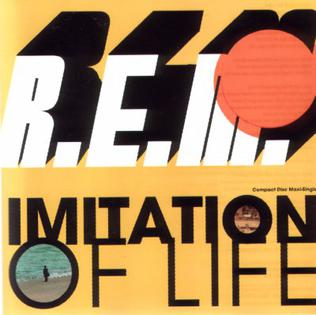
"Imitation of Life" is a song by American alternative rock band R.E.M. It was written by band members Peter Buck, Mike Mills, and Michael Stipe and produced by the band with Pat McCarthy for their 12th studio album, Reveal (2001). The track's title comes from Douglas Sirk's 1959 film of the same name and is used as a metaphor for adolescence and adulthood. One of R.E.M.'s most pop-influenced tracks, "Imitation of Life" has been described lyrically as "see[ing] through the puffed-up performance of a hopeful entertainer", as well as the enjoyment of love.
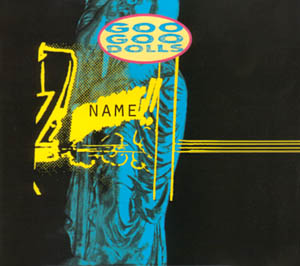
"Name" is a song by American rock band Goo Goo Dolls. It was released in September 1995 as the third single from their fifth studio album, A Boy Named Goo (1995). "Name" became the band's first major hit, topping both the US Modern Rock Tracks chart and the Album Rock Tracks chart. It also reached number five on the Billboard Hot 100. In Canada, "Name" peaked at number two on the RPM 100 Hit Tracks chart and number one on the RPM Alternative 30.

"Everyday Is a Winding Road" is the second single from American singer and songwriter Sheryl Crow's 1996 eponymous album. Neil Finn, lead singer of Crowded House, provides backing vocals. Paul Hester, another member of Crowded House, was the inspiration for the song. The single was issued in the United Kingdom in November 1996 and was released in the United States the following year.

"Don't Know Why" is a song written and composed by Jesse Harris that originally appeared on his 1999 album, Jesse Harris & the Ferdinandos. A cover of the song was the debut single of American singer Norah Jones from her debut studio album, Come Away with Me (2002).

"There You'll Be" is a song by American country music singer Faith Hill. Written by Diane Warren, produced by Trevor Horn and Byron Gallimore, and orchestrated by David Campbell, the song was released on May 21, 2001, and was included on the Pearl Harbor soundtrack. The track also appears on Hill's greatest hits albums There You'll Be and The Hits. "There You'll Be" is about remembering deceased acquaintances and reminding oneself that they will always be with them. The power ballad was first offered to Celine Dion, who turned it down because she did not want to record another romantic ballad for a soundtrack album.
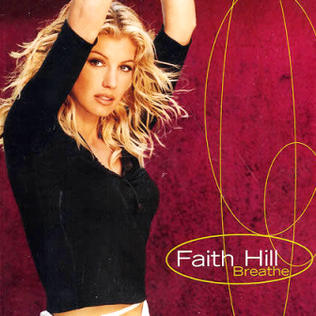
"Breathe" is a song written by Stephanie Bentley and Holly Lamar and recorded by American country music artist Faith Hill. Warner Bros. Records released it on October 4, 1999, as the first single from Hill's fourth album of the same name (1999). The song was produced by Byron Gallimore and Hill. "Breathe" became Hill's seventh number one on the Hot Country Songs chart in the United States, spending six weeks at number one. It also peaked at number two on the Billboard Hot 100 chart in April 2000. Despite not peaking at number one, it was the number-one single of 2000.

"Sunny Came Home" is a folk-rock song by American musician Shawn Colvin. It is the opening track on her 1996 concept album, A Few Small Repairs, shipped to radio in February 1997, and was released as a CDcassette single on June 24, 1997. In the United Kingdom, the song was released in July 1997 but did not chart until a re-release in May 1998.

"This Kiss" is a song by American country music singer Faith Hill from her third studio album Faith. It was written by Beth Nielsen Chapman, Robin Lerner and Annie Roboff, and produced by Hill and Byron Gallimore. It was released on February 23, 1998, as the album's first single.

"Black Balloon" is a song by American rock band Goo Goo Dolls. It was released in June 1999 as the fourth single from the band's sixth studio album, Dizzy Up the Girl (1998), and reached No. 3 in Canada, No. 16 in the United States, and No. 23 in Iceland.

"Let Her Cry" is a song by American rock band Hootie & the Blowfish. It was released in December 1994 as the second single from their debut album, Cracked Rear View (1994), and became a top-10 hit in Australia, Canada, Iceland, and the United States. The song received the Grammy Award for Best Pop Performance by a Duo or Group with Vocals in 1996.

"I Don't Want to Wait" is a song written, recorded, and produced by American singer-songwriter Paula Cole. Cole wrote the song in mid-1996 and released it as second single from her second studio album, This Fire (1996), on October 14, 1997. The single release was successful, reaching No. 11 in the United States and No. 5 in Canada. VH1 ranked "I Don't Want to Wait" as one of the 100 Greatest Songs of the '90s at No. 81. The song later served as the opening theme for the American teen drama television series Dawson's Creek, which ran from 1998 to 2003.
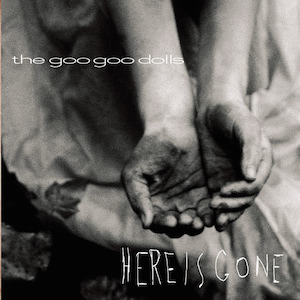
"Here Is Gone" is a song by American rock band Goo Goo Dolls. A song about yearning for a deeper relationship with someone, "Here Is Gone" was released on March 11, 2002, as the lead single from the band's seventh studio album, Gutterflower (2002). It reached number 18 on the US Billboard Hot 100 chart and number three on the Adult Top 40. The single also reached number 17 in New Zealand, becoming the group's second top-20 hit there.

"Where Have All the Cowboys Gone?" is a song by American singer Paula Cole. It was released on March 25, 1997, as the lead single from her second studio album, This Fire. The song is Cole's only top-ten hit on the US Billboard Hot 100, reaching number eight, and was her first top-ten hit in Canada, where it reached number seven. It was additionally a critical success, earning nominations for three Grammy awards: Record of the Year, Song of the Year, and Best Female Pop Vocal Performance.

"Constant Craving" is a song written by Canadian singer-songwriter k.d. lang and Ben Mink, performed by lang and included on her second solo album, Ingénue (1992). The song was released in the United Kingdom in April 1992 and won lang a Grammy Award in the category for Best Female Pop Vocal Performance in 1993, as well as an MTV Video Music Award for Best Female Video.
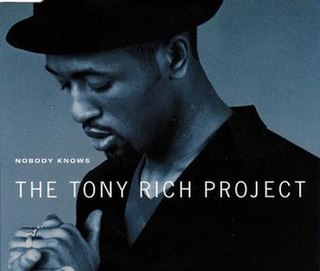
"Nobody Knows" is a song by R&B singer Tony Rich from his 1996 debut album, Words. Released as his debut single on November 7, 1995, the song peaked at number two on both the Billboard Hot 100 and Billboard Hot Adult Contemporary Tracks charts. It also became a hit in several other countries, topping the Irish Singles Chart and reaching number two in Australia and Canada, number four in the United Kingdom, and the top 20 in the Netherlands, New Zealand, and Sweden. Rich received a nomination for the 1997 Grammy Award for Best Male Pop Vocal Performance.

"Me" is a song written, produced, and performed by American singer-songwriter Paula Cole. It was released as the third and final single from her second studio album, This Fire (1996), in February 1998. Released only to radio, the song entered the top 40 on the US Billboard Hot 100 Airplay chart and peaked at number 17 on the Billboard Adult Top 40. In Canada, the song reached number 20 on the RPM 100 Hit Tracks chart. A promotional CD was also distributed in Germany.
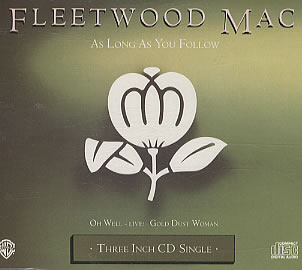
"As Long as You Follow" is a song by British-American rock band Fleetwood Mac. Performed by Christine McVie and written alongside her then-husband, Eddy Quintela, the song was one of two new tracks on the band's 1988 greatest hits album, along with "No Questions Asked". Lead guitarist Rick Vito singled out the guitar solo on "As Long as You Follow" as his best work with Fleetwood Mac.

"Calling All Angels" is a song by American rock band Train. It was included on the band's third studio album, My Private Nation, and produced by Brendan O'Brien. On April 14, 2003, the song was the first single to be released from My Private Nation, peaking at number 19 on the US Billboard Hot 100 and topping three other Billboard charts: the Adult Contemporary, Adult Top 40, and Triple-A listings. Outside the US, the song entered the top 40 in Australia and New Zealand.
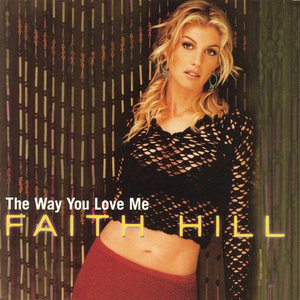
"The Way You Love Me" is a song written by Keith Follesé and Michael Dulaney and recorded by American country music singer Faith Hill. It was released on February 14, 2000, as the second single from her fourth studio album, Breathe (1999), and was later released to pop radio on August 15, 2000, becoming Hill's third single serviced to the format. The track utilizes Auto-Tune for Hill's backup vocals.




















